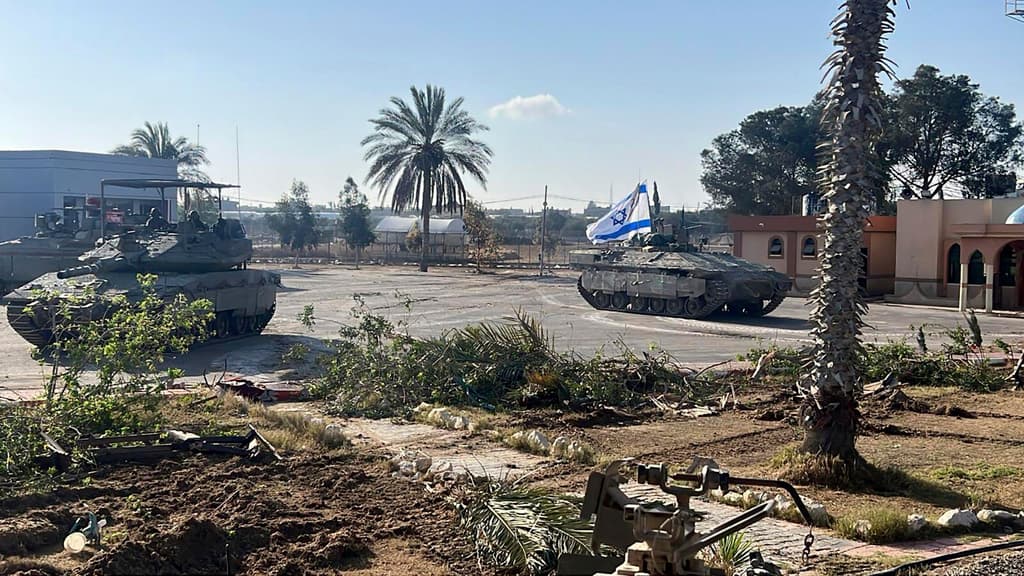Biden, Despite Vows of ‘Ironclad’ Support of Israel, Blocks Weapons Systems Deliveries as Report to Congress on War Looms
Biden has long warned Israel against a ‘major operation’ at Rafah, and the withholding of arms seems like his way of ensuring that the IDF does not widen its operation there any further.

Groucho Marx once vowed to stand by his principles, before adding that “if you don’t like them, I have others.” Similarly, President Biden’s “ironclad” support of Israel is looking increasingly fluid. When critics disapprove, he just finds other causes to support.
“My commitment to the safety of the Jewish people and the security of Israel is ironclad, even when we disagree,” Mr. Biden told supporters Tuesday during an event commemorating the Holocaust. In another “ironclad” vow last week, he said, “I’ll always make sure that Israel has what it needs to defend itself.”
Yet, on the eve of a critical report to Congress Wednesday, the administration is holding back the deliveries of several weapons systems, according to multiple press reports. The delay of arms deliveries was widely seen as a way to prevent Israel from entering Hamas’s remaining redoubt, at Rafah. While the recently launched Rafah operation seems limited in scope, it could certainly be widened.
Separately, Israeli officials are reportedly irate over Washington’s failure to notify them of Monday’s Hamas-orchestrated deal for a Gaza cease-fire. Over the weekend, Qatar and Egypt worked out with Hamas the details, which crucially differ from an earlier proposal that Israel had agreed to, and which Secretary Blinken touted as “very generous.”
While America may not have been a party to the Hamas deal, the CIA director, William Burns, was informed of its details over the weekend. Yet, even after he learned them, Mr. Burns failed to notify his Israeli counterparts that a new proposal had emerged, several Israeli press outlets reported Tuesday.
Israel and Hamas “should be able to close the gaps,” the National Security Council’s spokesman, John Kirby, said Tuesday, even after the Israeli government pronounced the proposed deal a “nonstarter.” Israel agreed nevertheless to send a negotiation team to Cairo, but the cabinet on Monday night also approved an Israel Defense Force Rafah operation. Military units captured the Rafah crossing connecting Gaza to Egypt.
Mr. Biden has long warned Israel against a “major operation” at Rafah, and the withholding of arms seems like his way of ensuring that the IDF does not widen its operation there any further. The Wall Street Journal cites “mounting criticism” of the administration over Gaza’s death toll as another reason to delay a sale of precision weapons to Israel.
The withheld arms reportedly include $250 million worth of 6,500 Joint Direct Attack Munitions, which enable unguided bombs to be steered to targets. The system, as well as $1 billion worth of tank shells, tactical vehicles, and mortar rounds, was approved by Congress.
“We are shocked that your administration has reportedly decided to withhold critical ammunition to Israel,” Senators Ernst of Iowa and Budd of North Carolina, both Republicans, wrote to Mr. Biden on Monday, the Free Beacon reports. “You promised your commitment to Israel was ironclad. Pausing much-needed military support to our closest Middle Eastern ally signals otherwise.”
On Wednesday the White House is due to deliver to Congress a critical paper it prepared in February. The report assesses whether Israel is using American-supplied weapons “in line with international laws on war and human rights.” A dozen Democratic lawmakers led by Senator Van Hollen are demanding a halt to arms deliveries if the report concludes that Israel has committed such violations.
The Washington-Jerusalem drift is bound to grow if the IDF’s Rafah operations widens further. Taking over the Rafah crossing was the easy part, as the main entry gate for goods and people to go between Gaza and Egypt is near the Israeli border. The civilian population there is relatively sparse. Israel will likely continue working to capture the Phildelphi corridor, where cash, ammunition, and larger weapons systems are smuggled in from the Egyptian side.
Israelis say controlling Philadelphi is essential to ending Hamas’s military capabilities and to ensuring it can never repeat attacks similar to October 7. Many in Israel also believe that Hamas will be more inclined to return hostages if it feels threatened, whereas Mr. Biden claims only diplomatic negotiations will work.
“We have already proven, in the previous release of hostages, that military pressure on Hamas is an essential condition for the return of our hostages,” Mr. Netanyahu said Tuesday, adding, “The Hamas proposal yesterday was designed to torpedo the entry of our forces into Rafah. That did not happen.”
Jerusalem officials say that at least two items in that proposal cross Israel’s red lines: Hamas says that it might replace living hostages with corpses in the first stage of the deal, when 33 of the captives are to be released in the course of 42 days. It also insists that during that first stage Israel would completely end the war under American guarantees.
Such demands are “inconsistent” with the previous proposal that Israel had agreed to, a war cabinet member, Benny Gantz, Mr. Netnayahu’s chief political rival, said Monday. Then, in apparent defiance of Mr. Biden’s pressure tactics, Mr. Gantz and the rest of the cabinet approved the operation at Rafah.

